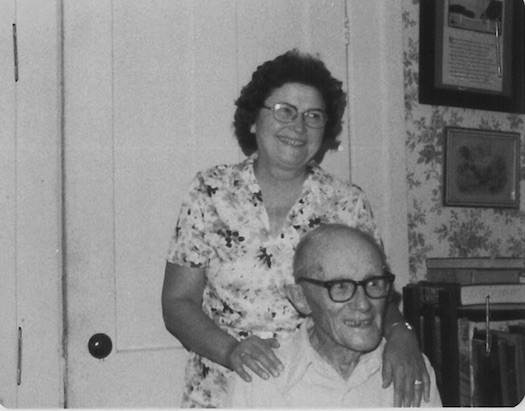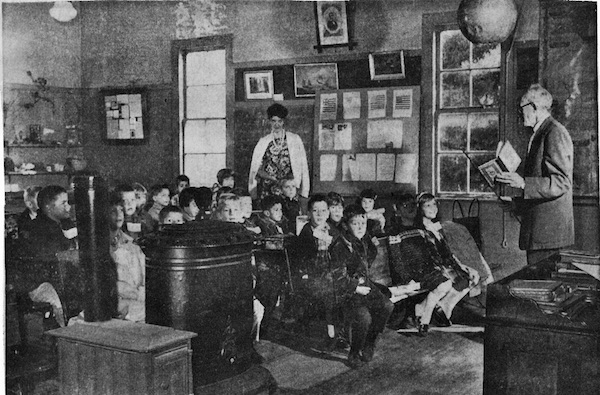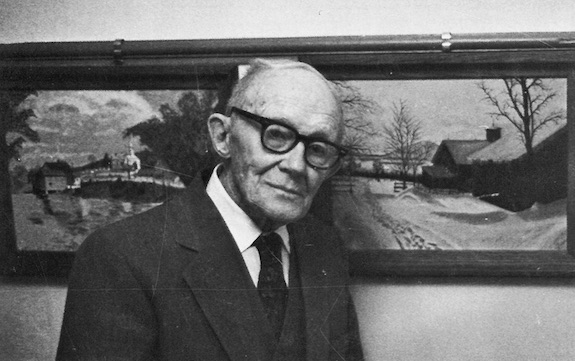Historic Childs: Howard Pratt chronicled life on the Ridge (Part 1)
By Doug Farley, Cobblestone Museum Director – Vol. 2 No. 24
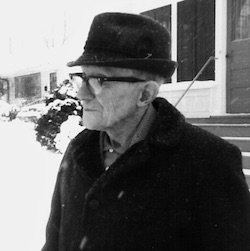
Howard’s appreciation for all things historic led him to become known as Orleans County’s dean of local history, a moniker that stuck with him all throughout his 99-year life.
Mr. Pratt was born on August 15, 1889 to Mr. and Mrs. John Henry Pratt. He and his sister Florence (James) attended rural school on the Ridge Road. Howard was a member of the first agriculture class at the Albion High School, graduating in 1911. Following graduation he attended a training class and earned a certificate to teach in public schools.
Howard’s first teaching position was in 1911 at Riches Corners earning $11 per week. He then taught the upper grades in Barre Center earning $12 per week, a raise in pay he thought to be quite substantial at the time. Later schools where Howard taught included the Bullard District on Ridge Road, Oak Orchard-on-the-Ridge and finishing up his teaching career at Eagle Harbor in 1936.
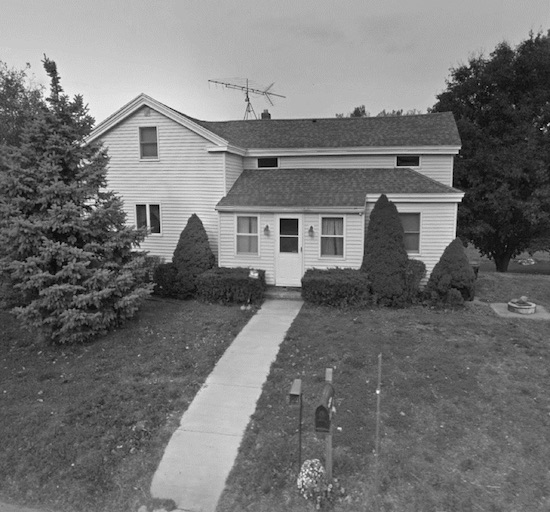
Pratt homestead, remodeled on several occasions, now Pitman residence
Howard met the love of his life, Leola Budd, and the two were married in 1914. They had four children, Marjorie (Rustay), John, Beth (Nesbitt) and Roger. Pratt lived with his family at 12883 Ridge Road in Gaines for most of his life. The Pratt homestead was originally purchased by Howard’s grandfather in 1842. Howard’s wife Leola died in 1972.
For about 10 years, Pratt spent two weeks each summer at Cooperstown learning crafts. He later became known as the “Chair-Man” and taught chair caning classes in his home. Pratt was the organizer of the first 4-H Club, known as the “Potato Club” and during WWII, he became the Orleans County 4-H Agent. During the three years Pratt served as County Agent, he did 34 radio programs on WHAM.
Following his term with 4-H, Pratt joked that he “retired” to farming. He recalled the days he worked as a farmer and drove cattle from Williamsville near Buffalo to his pasture land on the Ridge, a distance of about 50 miles. The trip took three days to complete. All of that followed a trip to Chicago by train to buy cattle, and then a return ride with the animals in the freight car back to New York. Howard took pride in his prize winning herd of Guernsey cattle. He accumulated about 1,500 ribbons from county and state fairs for his animals.
Pratt remarked that most retellings of the American Experience, fail to mention just how hard it was, and how much sweat it took, to make a living by farming. He also remembered something as simple as the odor that lingered when his mother baked fresh muffins with honey and molasses. Or, he remembered something more specific like the clothes President McKinley wore for the parade at the Pan American Exhibition in 1901 on the day before the president was assassinated.
About the time that Howard retired from farming, the Cobblestone Society was being formed and Pratt was asked to take charge of the Society’s Cobblestone School, a position he proudly accepted and continued for much of his later life. Pratt joined forces with retired cobblestone schoolhouse teacher, Ruth Applegate (shown with Pratt above) and the two were often seen leading school tours at the District #5 Cobblestone Schoolhouse.
Howard Pratt’s efforts greeting visiting students and leading the “typical day” tour at the one room schoolhouse were cherished moments for hundreds of school children over several decades. Pratt is shown here in the Cobblestone School with students from Barnard Elementary School near Rochester in 1967. He was 78 years old at the time.
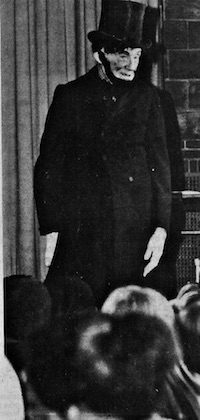
Later, in June 1962, he even made a trip to Washington, D.C., where he was asked to give a talk on the life of A. Lincoln. His convincing first-person presentation at the time was described as “nothing short of startling!” Howard recalled the trip with interest, “At the Lincoln Memorial my resemblance to Lincoln created such excitement that the guards came over and told me I’d better move along. I was getting more attention than the statue.”
Similar excitement erupted at the White House during Pratt’s living history visit. “Everyone wanted to get a picture with me,” he said. Over his many years, Pratt enjoyed presenting Abraham Lincoln to thousands of grade school children throughout Orleans County and beyond.
Throughout his life Howard developed a keen insight into local history. He was first appointed historian for the Town of Gaines in 1957. In 1959 he was appointed Co-Chairman with Cary Lattin for the Gaines Sesquicentennial. In 1960, he was elected to the Cobblestone Society’s first board of directors.
In 1968 Howard received a Certificate of Commendation from the American Association for State and Local History. Howard was instrumental in establishing the Orleans County Historical Association in 1979 to continue the work which was begun for the celebration of the nation’s Bicentennial in 1976.
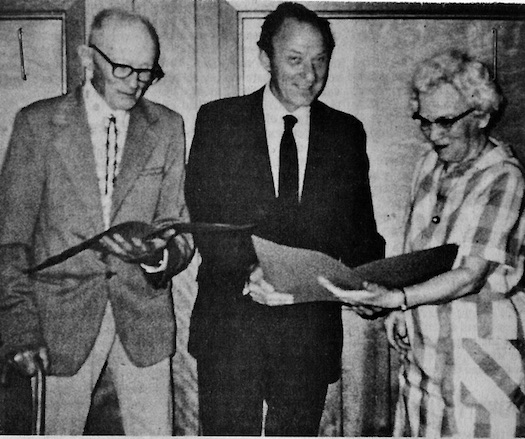
Howard Pratt with NYS Assemblyman R. Stephen Hawley and local author, Irene Gibson, when the authors were given special commendations from the NYS Legislature in 1980.
As a historian, Pratt turned his story telling ability into writing books on the subject. “Memories of Life on the Ridge” was his first of three books that would tell the autobiographical stories of his life His first book actually followed a five year stint writing a series of articles entitled, “Saga of the Ridge,” which were published in the Medina Journal-Register from 1964-1969. Pratt recalled that while writing those earlier articles, many folks asked him when he was going to compile the stories into a book. He responded to that with, “Now I finally have.” He said, “I never wanted to be a writer, but I always liked telling stories.” Later publications authored by Pratt included “Saga of the Ridge” in 1983, and “Life on the Ridge,” written in 1987 when Pratt was 98 years old.
When he wasn’t working on authoring one of his books about local history, Howard Pratt enjoyed his hobbies of painting (two of his paintings shown above), caning chairs, and restoring antique furniture. Howard also liked to travel and took several trips to Europe. On his third trip to Ireland he said, “I finally kissed the Blarney Stone when I was over there this summer. I love to travel and meet people because I learn so much. And, I love to talk.”
Pratt, even into his 90s, was always seen, out and about. At the age of 90 he took a nasty tumble, and fell off his roof while cleaning his gutters. After nursing his bruises, he was seen later that same year helping with repairs while standing on top of the roof at Pullman Memorial Church. Also at age 90, Howard was seen planting several peach trees in the back of his house.
Howard and his family were long time members of the Pullman Memorial Universalist Church which was dedicated in 1895. Local historian Bill Lattin recalls one time that Howards’ sister, Florence, was asked if she was present at the dedication of the church with George Pullman in attendance. She allowed how both she and her father attended. The inquisitor asked next, “Florence, did your brother Howard attend, too?” Florence replied with a droll little smile, “No. He was naughty and had to stay home.”
Sadly, Howard died at age 99, just a few months shy of his 100th birthday. He did however reflect earlier about his long life and said, “There’s no real secret to longevity. Stay active and keep working at what you enjoy.” Another typical Pratt witticism was “Everything comes to him who waits, if he works while he waits.”
























